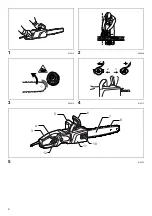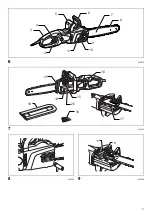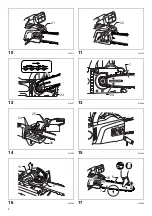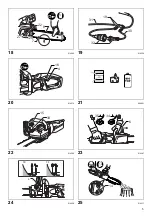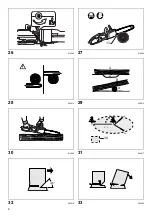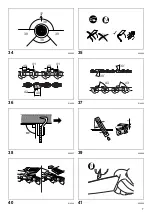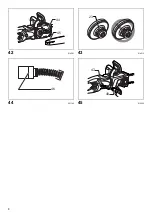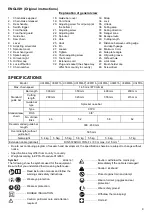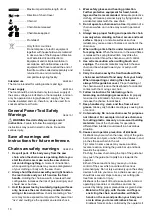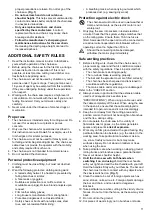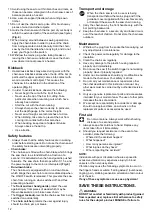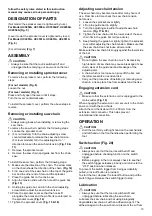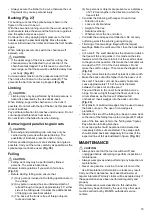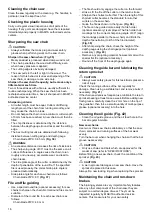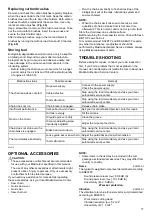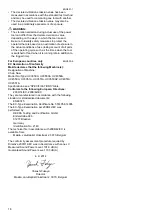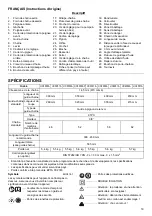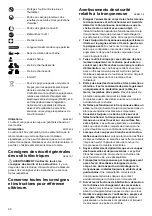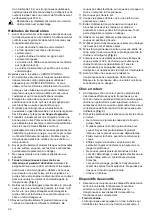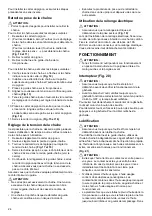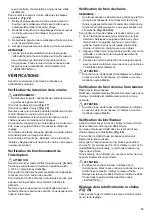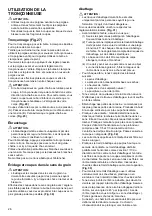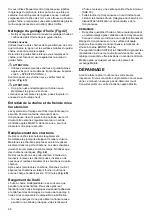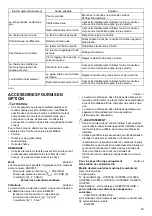
14
being thrown off the saw excessively quickly. Mineral oils
must not be used, as they are harmful to the environment.
(Fig. 21)
CAUTION:
• Prevent the oil from coming into contact with the skin
and eyes. Contact with the eyes causes irritation. In the
event of eye contact, flush the affected eye
immediately with clear water, then consult a doctor at
once.
• Never use waste oil. Waste oil contains carcinogenic
substances. The contaminants in waste oil cause
accelerated wear of the oil pump, the bar and the
chain. Waste oil is harmful to the environment.
• When filling the chain saw with chain oil for the first
time, or refilling the tank after it has been completely
emptied, add oil up to the bottom edge of the filler neck.
The oil delivery may otherwise be impaired.
To fill the oil, perform the following steps:
(Fig. 22)
1. Clean the area around the oil filler cap thoroughly to
prevent any dirt from entering the oil tank.
2. Unscrew the oil filler cap and add oil up to the lower
edge of the filler neck.
3. Screw the oil filler cap firmly back in place.
4. Wipe away any spilt chain oil carefully.
NOTE:
• When the chain saw is used for the first time, it may
take up to two minutes for the saw chain oil to begin its
lubricating effect upon the saw mechanism. Run the
saw without load until it does so (see “CHECKS”).
CHECKS
Before starting work, carry out the following checks:
Checking the chain tension
WARNING:
• Always withdraw the mains plug before checking the
chain tension, and wear safety gloves.
(For nut models)
(Fig. 17)
(For lever models)
(Fig. 18)
Make sure the saw chain fits snugly against the lower side
of the bar (see circle).
Check the chain tension frequently, as new chains are
subject to elongation.
Excessively high tension of saw chain may cause
breakage of saw chain, wear of the guide bar and
breakage of the adjusting dial.
A chain which is too loose can jump off the bar, and
therefore presents an accident risk.
If the chain is too loose: Refer to the section titled
“Adjusting saw chain tension” and adjust the saw chain
tension again.
Checking the switch action
CAUTION:
Before plugging in the tool, always check to see that the
switch trigger actuates properly and returns to the “OFF”
position when released.
To prevent the switch trigger from being accidentally
pulled, a lock-off button is provided.
To start the tool, depress the lock-off button and pull the
switch trigger. Release the switch trigger to stop.
Do not pull the switch trigger hard without depressing the
lock-off button. This may cause switch breakage.
Checking the chain brake
NOTE:
• If the chain saw fails to start, check whether the chain
brake is released. To release the chain brake, pull the
hand guard backwards firmly until you feel it engage.
(Fig. 23 & 24)
Check the chain brake as follows:
1. Hold the chain saw with both hands when switching it
on. Hold the rear handle with your right hand, the front
handle with your left. Make sure that the bar and the
chain do not contact with any object.
2. First press the lock-off button, then the switch trigger.
The saw chain starts immediately.
3. Press the front hand guard forwards using the back of
your hand. Make sure that the saw chain comes to an
immediate standstill.
CAUTION:
• If the saw chain does not stop immediately, do not use
the saw under any circumstances. Consult Makita
authorized service centers.
Checking the run-down brake
Switch on the chain saw.
Release the switch trigger completely. Make sure the saw
chain comes to a standstill within a second.
CAUTION:
• If the saw chain does not stop immediately, do not use
the saw under any circumstances. Consult Makita
authorized service centers.
Checking the chain oiler
Before starting work, check the oil level in the tank, and
the oil delivery.
The oil level can be seen in the oil level sight shown in the
figure.
(Fig. 25)
Check the oil delivery as follows:
Start the chain saw.
With the saw running, hold the saw chain approximately
15 cm above a tree trunk or the ground. If lubrication is
adequate, the oil spray will produce a light oil trace.
Observe the wind direction, and do not expose yourself to
the oil spray unnecessarily.
CAUTION:
• If an oil trace is not formed, do not use the saw. The
lifespan of the chain will otherwise be reduced. Check
the oil level. Clean the oil feed groove and the oil feed
hole in the bar (refer to “MAINTENANCE”).
Adjusting the chain lubrication (Fig. 26)
You can adjust the oil pump feed rate with the adjusting
screw.
WORKING WITH THE CHAIN SAW
CAUTION:
• Always use a front handle and rear handle and firmly
hold the tool by both front handle and rear handle
during operations.


